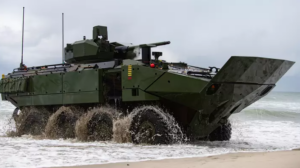The Marine Corps announced last Thursday it has authorized Amphibious Combat Vehicles (ACV) to resume waterborne operations, after the force implemented a safety pause following a training incident in July.
The decision follows an internal review and the issuing of a new interim guidance which allows ACVs to operate in open waters as long as the height of breaking waves is not above 4 feet.

“We remain steadfast to the safety of our Marines who conduct amphibious operations, and expect strict adherence to established standards that allows our ACVs to return to waterborne operations,” Lt. Gen. David Furness, deputy commandant for plans, policies and operations, said in a statement. “Our training and discipline allows us to continue sharpening our warfighting abilities to remain the Nation’s premier expeditionary force in readiness.”
Following a July 19 incident during a training exercise at Camp Pendleton in California involving two ACVs, the Marine Corps announced a pause on all waterborne operations with the platform (Defense Daily, July 22).
The two ACVs, which are built by BAE Systems, became disabled in heavy surf during the incident, while there were no reported injuries to Marines.
A week later, the Marine Corps announced it would authorize ACV water operations in protected waters only, such as Area 21, Del Mar Boat Basin at Camp Pendleton (Defense Daily, July 29).
The Marine Corps said the new interim guidance issued along with the decision to resume waterborne operation is intended to “enhance operational safety when conducting ACV training.”
“The interim maximum surf conditions are conservative and derive from existing safe operating surf conditions for U.S. Navy and Marine Corps landing craft, and allows the service to better understand surf conditions through ongoing vehicle testing,” the Marine Corps said in a statement.
Last month, the Marine Corps awarded BAE Systems an $88 million deal to build several of its turreted variant Amphibious Combat Vehicles (ACV) for testing (Defense Daily, Aug. 16).
BAE Systems said at the time that testing with the multiple ACV-30s, the version of its vehicle outfitted with a 30mm cannon, will inform the Marine Corps’ full-rate production decision for the variant.
The Marine Corps is pursuing a family of vehicles approach for ACV, which includes the base personnel platform, a recovery variant (ACV-R), a command and control platform (ACV-C) and the ACV-30.
Both the base personnel variant of the ACV and the ACV-C are now in full-rate production, with the Marine Corps having awarded BAE Systems an $89.5 million deal for delivery of 14 of the command and control vehicles in May.
In March, the Marine Corps awarded BAE Systems a $173.6 million production order for 36 more ACV base personnel vehicles and a $34.9 million deal for design and development of the ACV-R (Defense Daily, March 30).
The Marine Corps has also previously tasked BAE Systems with integrating a suite of C4/unmanned aerial system capabilities onto an ACV to study if such a platform could meet the mission requirements for the future Advanced Reconnaissance Vehicle.